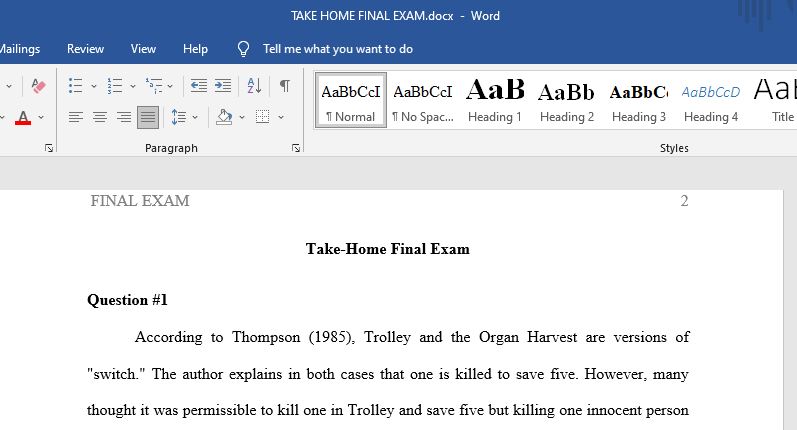Take-Home Final Exam
Clearly and concisely answer each of the following questions in absolutely no more than a half, double-spaced typed page. (Use 12 point Times New Roman with one-inch margins, header, and footer). You will not receive credit for any part of your answer that exceeds this space restriction.
You may simply answer the question (citing the question number) without rephrasing it or formulating a thesis statement.
If you work with others on your answers, your answers must be put entirely in your own words. If the language of your answer is at any point even close to that of another student, you automatically fail.
- Is there a morally relevant difference between the “switch” and “bridge” versions of the Trolley Problem? Explain.
- Present a principled answer to the “Covid Trolley Problem.” Consider and answer an objection to your proposed answer.
- Present Adam Smith’s view of money. Explain A. Mitchell-Innes’ objection to it.
- How according to Hockett and James is money both a sort of promise and yet normally backed by the threat of prison?
- What according to Sandel is the difference between “fairness” and “corruption” arguments about money? Be sure to give examples of both.
- What is “value capture” according to Nguyen, and how might games and money be similar in both motivating us? How in light of his view might money distort our values?
- How and why according to Hockett and James can anything necessary and technologically possible for climate change adaptation be paid for?
- Are we personally obligated to reduce our emissions to zero, aside from what other people do and any collective obligations we may have? Give reasons.
- Explain given Nordhaus why a utilitarian might urge that we are obligated to make large sacrifices for the benefit of future people. Explain why according to Broome or James we should seek “efficiency” instead. (Be sure to explain what “efficiency” means in this context.)
- Explain using examples the difference between “green growth,” “degrowth,” and “a-growth” positions.
- What is a circular economy? Explain using Raworth’s discussion how money or other credit/debt relationships might facilitate it.
- State Naess’ view of why our natural environment has value. Give Routely’s argument that it does. Evaluate his argument.
Requirements: 6 pages not include question Each,,,…please use the readings no OUTSIDE SOURCESj
Answer preview:

word limit:1974
